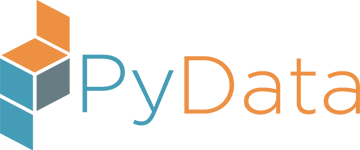Volunteer at PyData Global 2022
We are excited for the third edition of PyData Global and are looking for volunteers to serve on the organizing committee. The committee is a great way to meet and work with people from all around the world and give back to the open-source community.
Committee Responsibilities
Committee organizers will be able to choose to serve on one or more of the committee subactivities: program, attendee experience, community support/helpdesk, volunteer coordinating, DEI, and marketing
People of all experience levels of and backgrounds welcome and encouraged. The time commitment is a few hours a month ramping up to the conference.
Those interested should email [email protected]
PyData Meetups
PyData Meetups consist of 190,047 members, 192 groups, and span 68 countries. Want to find your local community?
Find your local chapter here – https://www.meetup.com/pro/pydata/
Interested in starting a chapter?
Check out https://pydata.org/start-a-meetup/ and email [email protected]
Contribute Code
PyData is an educational program of NumFOCUS, a 501(c)(3) nonprofit charity in the United States. Through the combined efforts of many developers, dozens of open-source projects are developed and maintained entirely through community efforts. Each contribution helps our projects continue to provide high functioning, quality code.
Every project has its own guidelines for how to contribute.
Interested in Contributing?
Check out https://numfocus.org/support#contribute to see the projects and get started.
Volunteer to speak at a Conference
PyData conferences are community lead and organized, and we want to hear from you! If you are interested in attending an upcoming PyData Conference, we invite you to consider submitting a talk or tutorial.
First-time speakers encouraged!
Interested in Speaking?
Check out https://pydata.org/upcoming-events/ to see upcoming PyData Events.
Tips on How to Write a Successful Proposal
A proposal serves two purposes: 1) convince the Program Committee to accept your proposal, and 2) act as the description of the talk/tutorial on the schedule. If accepted, you will have the opportunity to further edit and clarify the proposal ahead of the schedule’s publication.
The guidelines for proposing a talk versus a tutorial are essentially the same.
Good proposals include:
- The topic and why it’s interesting
- The audience that will benefit from attending this talk/tutorial
- The takeaway for the audience
- Any background knowledge needed to understand the talk/tutorial
- Approximate time breakdowns of how the material will be covered, e.g. minutes 0-10: X1, minutes 10-15: Y1, etc.
There are two parts to a proposal:
- Abstract: The abstract tells attendees what the talk/tutorial is about. It should answer all of the above questions, but it should remain short and to-the-point. This is your chance to pitch attendees on watching your talk/tutorial. If you are submitting a tutorial proposal, the abstract should also specify the requirements for participating and how materials will be distributed (e.g. Github repo, links, etc). If your materials are already hosted publicly somewhere, you can include the link.
- Description: The description expands on the abstract and provides background and additional details about your talk/tutorial. It is often helpful for talk descriptions to include an outline of the talk/tutorial. The Program Committee reads each description carefully to determine if a talk/tutorial is a good fit. This is your chance to pitch the Program Committee on accepting your talk/tutorial. The Program Committee does occasionally ask for more information after proposals have been submitted, but it’s better to include relevant details up front and try to anticipate what questions the Committee will have after reading your proposal. For example, if you think the Committee may think you’re trying to cover too much ground, an outline with time estimates could help alleviate that concern.
Additional Talk/Tutorial Proposal Suggestions
- Who is your target audience? Think about your target audience in terms of job role (data scientist, engineer, researcher, etc.) and experience level. Being clear about who you are speaking to (and the background knowledge you can expect them to have) is helpful both to you as you prepare your presentation, as well as to the audience considering whether your presentation is a good fit for them to attend.
- Clear title: A catchy title can be useful, but don’t overdo it. People should get a rough idea of what your presentation is about just by reading the title. Your proposal and your presentation should be consistent with your title.
- Get feedback: Ask friends and colleagues to review your abstract; bonus points if they are your target audience. Take time to tweak your abstract if needed. Additionally, if you are a first-time speaker, please indicate this in your proposal and we will reach out with more information regarding mentorship opportunities.
Common Pitfalls
Here are some common pitfalls that could lead to the proposal not being understood or rejected by the Program Committee:
- Overly long proposals: Keep it simple and clear. Good proposals typically provide all the important information within 200 words. This is not a strict limit, just a suggestion to help you stay focused.
- Future work: While talking about future work is interesting and could be mentioned in your talk, the core content of the talk should already be shaped, and you should be able to describe it in your proposal. Don’t rely too heavily on future data collection or future prototyping, because things often don’t go as expected.
- Sales pitches: We are a community of creators and users of open-source scientific computing tools. You can reference your closed-source product or platform, but the audience will find the talk more interesting if they can try your techniques with the open source PyData stack. Your problem definition, proposed techniques, and business domain are also interesting, but sales pitches are typically rejected.
- Repeated talks: We have a strong preference for new talks, and new speakers. If your talk is already available online, it is unlikely to be accepted for the conference.
Any questions? Feel free to reach out to [email protected]!
